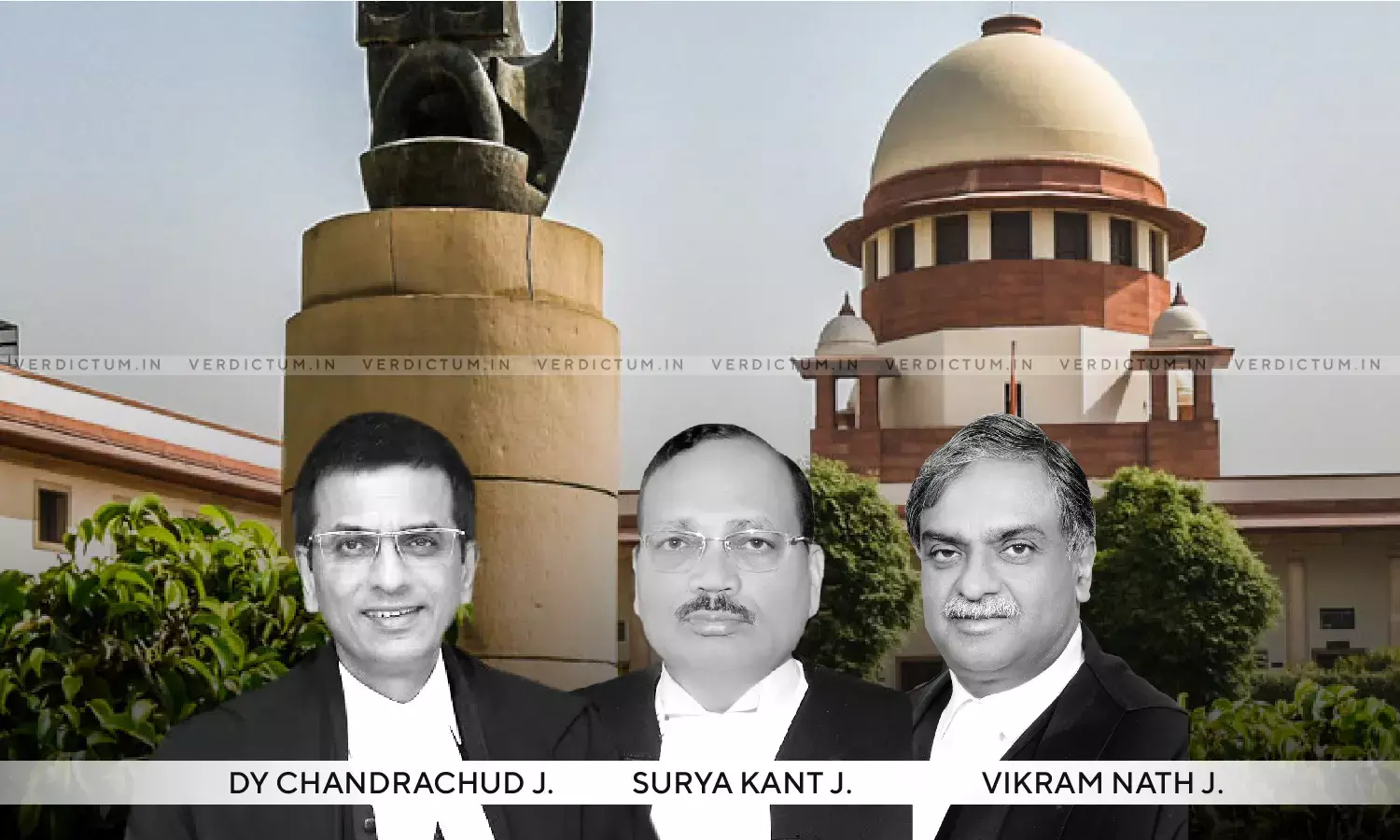Indian Importers Not Liable To Pay Separate IGST On Ocean Freight - Supreme Court

A three-judge bench of Justice Dr. D.Y. Chandrachud, Justice Surya Kant, and Justice Vikram Nath has held that the imposition of separate tax on an Indian importer for the supply of services by shipping line in a CIF (Cost, Insurance, and Freight) Contract would be in violation of Section 8 of the Central Goods and Services Tax (CGST) Act.
The Court observed that the Indian Importer being liable to pay Integrated GST (IGST) on composite supply which includes the supply of goods and service of transportation, insurance, etc., could not be made liable to pay IGST separately for Ocean freight paid by the foreign seller to a foreign shipping line on a reverse charge basis.
Facts & History of the Case
Prior to the enforcement of GST, service tax on ocean freight was exempted. Post enforcement of GST, the Central Government through notification levied an integrated tax of 5% on transportation of goods in a vessel from a place outside of India up to the customs stations of clearance.
The Union Government approached the Supreme Court challenging the Order of the Gujarat High Court where two notifications issued by the Central Government were held to be unconstitutional for exceeding powers conferred by the IGST and the CGST Act.
Issue – Whether an Indian importer can be subjected to Integrated Goods and Services Tax for ocean freight paid by a foreign seller to a foreign shipping line on a reverse charge basis.
Mr. N Venkataraman Additional Solicitor General (ASG) representing the Union of India argued that -
Integrated Tax was introduced to level the playing field between foreign shipping lines and Indian shipping lines.
In Laghu Udyog Bharati v. Union of India where service tax imposed on a reverse charge basis was struck down as the legislature had failed to identify the persons liable to pay such tax, the ASG argued that Section 24(iii) of the CGST Act defines and identifies the persons liable to pay tax on a reverse charge basis. In view of the above, the imposition of IGST on Ocean Freight on an Indian Importer is justified.
A combined reading of Articles 246A and 279A explains that the ultimate decision-making body in framing GST law, is the GST Council, being a constitutional body.
In CIF transactions, the Indian Importer does not pay for ocean freight despite receiving the benefit of transportation.
CIF transaction and OGST on Ocean Freight being two independent transactions, do not qualify as composite supply under Section 2(30) of the CGST; Moreover, in McDowell and Company Ltd. v. Commercial Tax Officer, it was held that a single element can constitute the basis of a levy, and form part of the value for another transaction, the same cannot be termed as double taxation.
Mr. V Sridharan, Mr. Harish Salve, and other Senior Counsels representing the Respondents argued that –
Section 5(3) of the IGST Act merely empowers the Government to specify the categories of supply, leaving the liability to pay tax on the recipient and not to specify the person(s) liable to pay tax on a reverse charge basis.
Taxable event for levy of GST being the supply of goods or services, no tax under IGST, CGST, or State Goods and Services Tax can be imposed in the absence of supply.
The Indian recipient is only a recipient of goods and not services. In such a case of no service being received, the question of reverse charge does not arise.
AS per the decision of this Court in GVK Industries v. Income Tax Officers, IGST Act having no extra-territorial application, cannot levy tax on Ocean Freight paid by a foreign seller to a foreign shipping line.
In Ispat Industries Ltd. v. Commissioner of Customs, it was held that in a CIF contract, freight is considered a part of the price paid to the seller, and any further addition of transportation charges is contrary to statutory provisions.
Held
The Bench observed that – "Article 286(1) stipulates that the State shall not levy tax when the supply of goods or services takes place outside the State or in the course of import or export of goods or services from the territory of India."
In view of the above, the Bench held that the -
Recommendations of the GST council would not be binding on the Union and the States. Article 279(1) being introduced through the Constitutional Amendment Act 2016 indicates the Parliament's intention for the recommendations of the GST Council to have a persuasive value. The Government is bound by the recommendations of the GST Council while making rules under the CGST and IGST Act.
The levy of tax on the 'service' aspect of transportation is in violation of the principle of composite supply enshrined in Section 2(30) r/w Section 8 of the CGST Act.
In this context, the Bench held that – "Since the Indian importer is liable to pay IGST on the 'composite supply', comprising of supply of goods and supply of services of transportation, insurance, etc. in a CIF contract, a separate levy on the Indian importer for the 'supply of services' by the shipping line would be in violation of Section 8 of the CGST Act."
Dismissing the appeals presented by the Union of India, the Bench held that – "in a CIF contract, a separate levy on the Indian importer for the 'supply of services' by the shipping line would be in violation of Section 8 of the CGST Act"
Click here to read/download the Judgment

